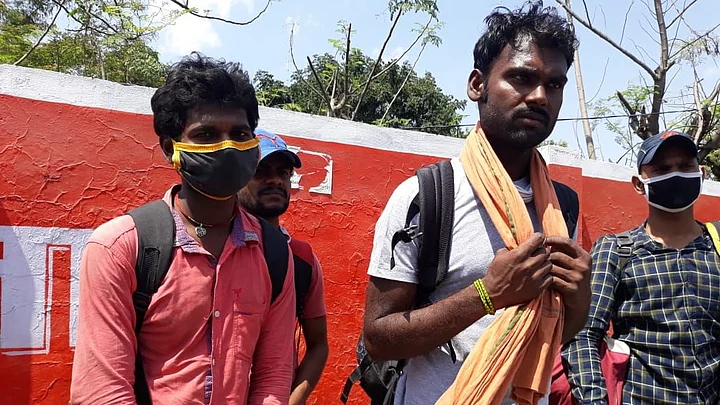Mahendra Ram, a labourer, had only Rs 100 in his pocket as he started off from Haryana to his home, Hazaribagh, in Jharkhand.
Mahendra does the work of plastering floors and walls at other people's homes. He didn't get his wages when the sudden news of lockdown came forcing hundreds like him to leave for their hometowns.
“I was given Rs 750 before leaving. Most of the money has been spent on train ticket. The person for whom I work has assured that he will transfer another Rs 9,000 once I reach my village.”Mahendra Ram, Labourer
Some frantic scenes were witnessed at Ranchi's bus stop on 23 March 2020 as male passengers, most of them, migrant labourers struggled to make it back to their respective villages.
The first and foremost difficulty they faced was how to go back with no public transport available after the lockdown was announced on 22 March.
Speaking to The Quint over phone, Siraj Dutta, an activist associated with the Right to Food Campaign, explained how lack of preparation on part of the district administration wreaked havoc on workers who are desperately trying to go back:
“There was no preparation done on part of the district administration. No help desk was available, be it at the bus stop or railway station. Most of these people have less cash under such circumstances and it’s mostly private buses ferrying passengers and even overcharging them.”Siraj Dutta, Activist, Right to Food Campaign
In a recent video posted on Twitter, one labourer who was waiting at the bus stop as there was no transport available for Bihar, he could be heard narrating his ordeal.
He even claims that 'prashasan' (administration), a reference to police officials, is allegedly asking for Rs 20,000 per two persons for dropping at the Bihar border. The Quint has not been able to verify this claim independently.
For thousands of migrant labourers the lockdown announced in the wake of Covid-19 outbreak has brought their lives literally to a standstill even as they continue to be on the move.
On 21 March, pictures of workers flocking the main bus stop in Pune made it to the front page of newspapers as anxious men and women were seen standing in queues outside ticket counters.
In Delhi, however, the migrant labourers haven't started leaving the city yet, according to an activist who closely tracks labour-related issues.
Speaking to The Quint, Sunny, who works with the 'Mazdoor Bigul Dasta' in Delhi confirmed that factory owners in the industrial clusters of Bawana, Wazirpur and Jhilmil had told the workers not to leave till 31 March.
But lockdown means that factories are not functional at all, resulting in loss of daily wages for workers employed at these production units in Delhi.
“Most of these factories don’t give paid leaves, which means, that daily wages will be deducted from the salary of workers during the lockdown.”Sunny, Activist, Mazdoor Bigul Dasta
Both Siraj and Sunny agree that it's too early to draw comparison in terms of impact on informal sector as was witnessed after demonetisation in 2016.
The government machinery seems to have failed in terms of safe transportation of these workers who are headed to native places where again there is no source of livelihood. Complete blockade also means that they will not be able to sell their own produce such as vegetables and fruits thus, making it difficult for them to sustain like this for a long-term.
(At The Quint, we question everything. Play an active role in shaping our journalism by becoming a member today.)
